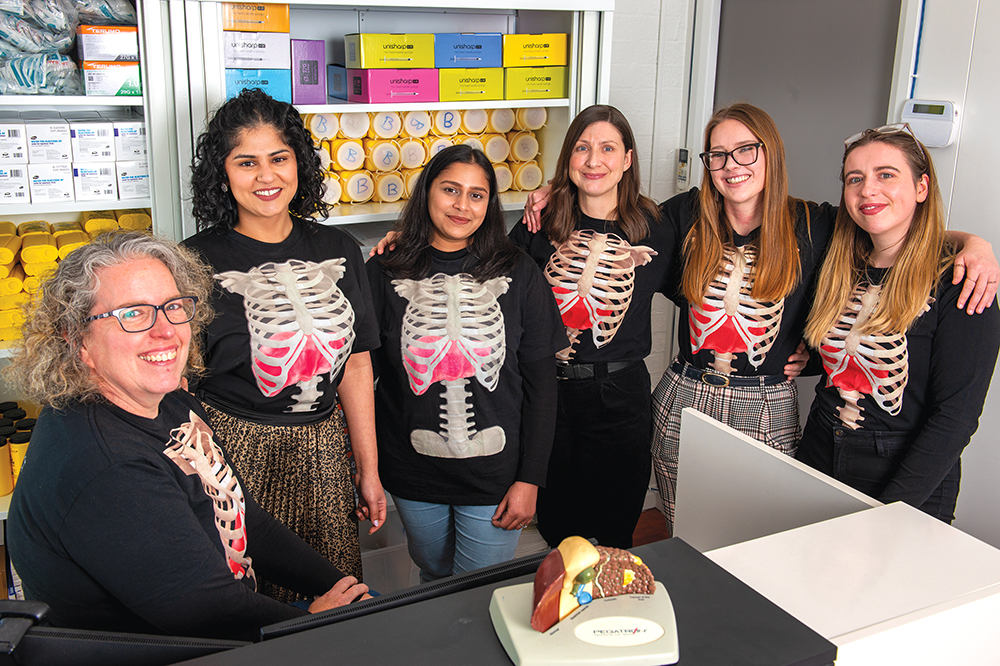
“It’s important to know your status as viral hepatitis affects your liver,” says Hepatitis ACT executive director SARAH AHMED.
The World Health Organization has set a target to eliminate hepatitis by 2030, tying in with the theme for this year’s World Hepatitis Day, July 28, “Hepatitis can’t wait!”
Hepatitis ACT executive director Sarah Ahmed says this is an important opportunity to give visibility to, and raise awareness of viral hepatitis, along with driving better outcomes for people affected by viral hepatitis.
World Hepatitis Day is one of only eight official health days declared by the World Health Organization.
However, Sarah says business as usual is not going to cut it.
“We’re so close to 2030 now, we need significantly more investment to resource the sector to reach that goal,” she says.
“We cannot afford to wait any longer, too many people are still dying from complications arising out of viral hepatitis and it’s not okay, it’s not acceptable.”
Since October 2022, Hepatitis ACT has offered finger-prick testing for hepatitis C.
“You no longer need to go to the doctor, get a referral and a blood test at a pathology lab, sometimes waiting weeks for your results. Come into our office in Turner, get a quick finger-prick blood test done and have your results back within the hour,” says Sarah.
Hepatitis ACT has recently completed 100 tests on their point-of-care testing (POCT) machine. The aim is to have 250 tests completed in the next three months.
“It’s important to know your status as viral hepatitis affects your liver; if untreated it can develop into liver cirrhosis or liver cancer. Liver cancer is currently the fastest growing cause of cancer related deaths in Australia,” says Sarah.
“A doctor is available on Thursday afternoons to conduct follow up testing on those service users who have tested positive.
“Hepatitis ACT has a great relationship with O’Connor Capital Chemist located across the road from our office. This ensures that medications will be available as soon as prescriptions are issued.”
Sarah says she can’t stress enough the importance of looking after your liver, and clearing the stigma that surrounds viral hepatitis.
“The liver performs over 500 functions in our bodies. If you can get tested and prevent your liver from being damaged, why not do a simple finger-prick test?” she says.
“There is a lot of fear and confusion surrounding viral hepatitis. When people say ‘hepatitis’ an image pops up in everyone’s head, and it’s usually the wrong one.
“Anyone can get viral hepatitis, it doesn’t discriminate. The biggest concern with the stigma around hepatitis B and hepatitis C is people not getting tested or delaying treatment. The longer people live with chronic viral hepatitis, the more their liver is getting damaged and the greater the risk of liver cancer.
“An example of fear around viral hepatitis is risk of transmission through spit. The likelihood of saliva containing a substantial amount of blood and it passing into the recipient’s bloodstream, such as through an open wound, the eyes or mouth, is so small that the risk of hepatitis from spitting is near zero.”
Sarah says having an understanding of the risks will help break down the fear and stigma.
To help prevent the spread of hepatitis B, hepatitis C and other blood borne viruses (BBVs), Hepatitis ACT runs a Needle and Syringe Program (NSP), offering clean injecting equipment to their service users in a safe, respectful, judgement-free environment.
“The NSP is the frontline for harm reduction and paves the way for referrals and connection to counselling, health/medical needs, social and other supports,” says Sarah.
“Not only do we prevent and minimise the risk of BBVs and infections from spreading to the community through sterile injecting equipment and education, we also provide free clothing, food, bread, toiletry packs, free naloxone, POCT and support for pretty much everything else.
“Workforce development is another service provided by Hepatitis ACT. Tailor-made presentations are delivered to organisations, community groups or health organisations, aimed at educating staff on what viral hepatitis is, how it is spread and what testing and treatment options are available.”
Sarah encourages people to contact the Hepatitis Infoline on 1800 437222 for more information about the testing and treatment options available, or hepatitis in general.
“Globally, 325 million people live with hepatitis, with more than 1.1 million lives lost each year,” she says.
On July 28, Hepatitis ACT raises its collective voices to call for more action for people affected by hepatitis. Supporters of World Hepatitis Day are lighting up landmarks across Canberra green in honour and acknowledgement of those affected by viral hepatitis and also to raise awareness and demand urgent action from our decision-makers to give the ‘green light’ to prioritise the elimination of viral hepatitis by 2030.
Old Parliament House, John Gorton Building, Shine Dome, National Carillon and the National Museum of Australia will be among many Canberra buildings and monuments that will be lit up green for World Hepatitis Day.
Hepatitis ACT is located at 36 David Street, Turner (opposite the O’Connor shops). More information at hepatitisact.com.au or call 6230 6344.
Who can be trusted?
In a world of spin and confusion, there’s never been a more important time to support independent journalism in Canberra.
If you trust our work online and want to enforce the power of independent voices, I invite you to make a small contribution.
Every dollar of support is invested back into our journalism to help keep citynews.com.au strong and free.
Thank you,
Ian Meikle, editor




Leave a Reply